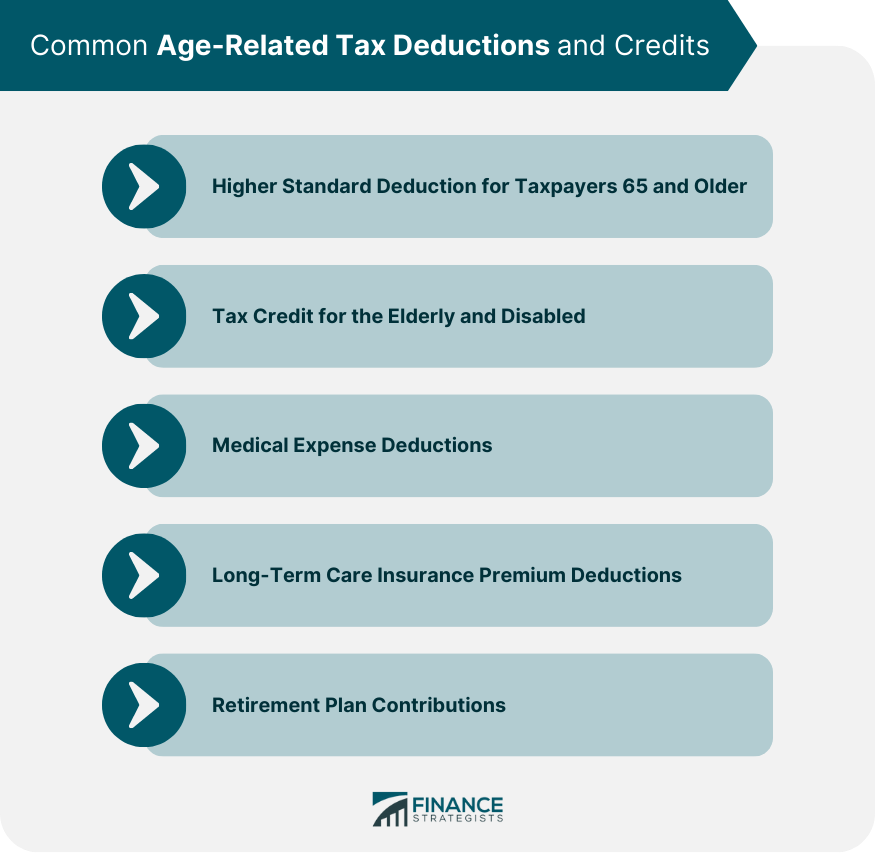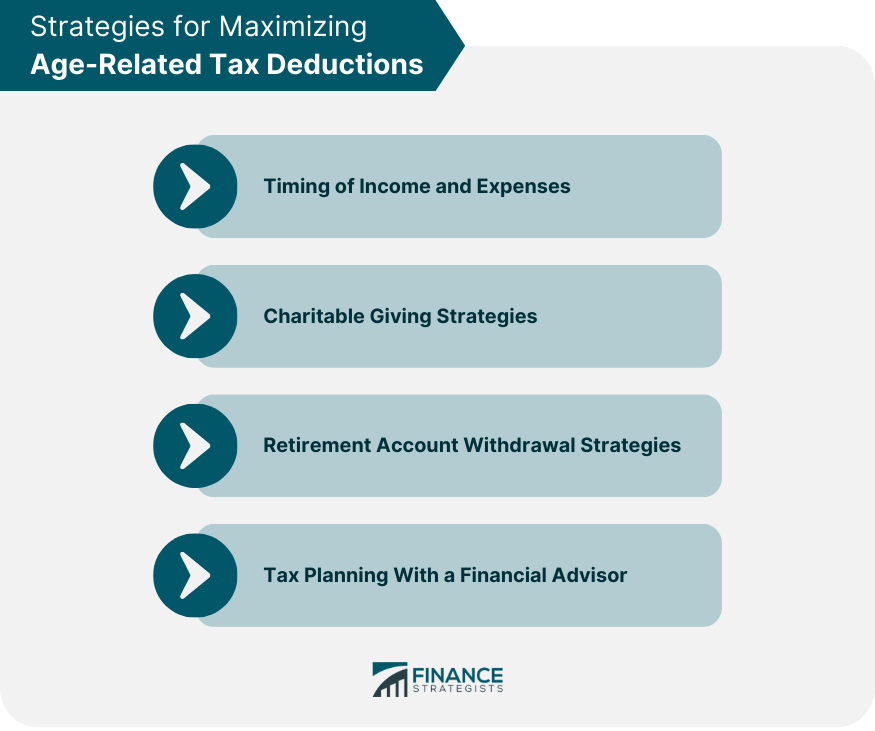Age-related tax deductions are tax benefits designed for seniors, usually 65 or older, to help reduce their taxable income and ultimately lower their tax liability. These deductions take into account the unique financial circumstances and needs of older taxpayers, such as increased medical expenses, retirement plan contributions, and long-term care insurance premiums. Age-related tax deductions can play a significant role in helping seniors save money, maximize their retirement funds, and better manage their financial situation during their retirement years. To qualify for age-related tax deductions, taxpayers must meet the minimum age threshold, which is typically 65 years old by the end of the tax year. If you are married and filing jointly, your spouse's age may also affect your eligibility for certain deductions. Many age-related tax deductions have adjusted gross income (AGI) limits. Your AGI is your total income minus certain deductions. Different deductions may have varying income thresholds, so reviewing the specific requirements for each deduction you plan to claim is essential. Your filing status can also impact your eligibility for age-related tax deductions. Common filing statuses include single, married filing jointly, married filing separately, head of household, and qualifying widow(er) with a dependent child. Taxpayers aged 65 and older are eligible for a higher standard deduction, which varies based on filing status. The higher standard deduction reduces taxable income, potentially resulting in lower taxes. If you choose to claim the higher standard deduction, you may not itemize deductions on your tax return. If you are 65 or older or permanently and totally disabled, you may qualify for the tax credit for the elderly and disabled. This credit can help reduce your tax liability. Eligibility criteria and credit amounts depend on your income and filing status. Taxpayers who itemize deductions can deduct eligible medical expenses that exceed a certain percentage of their AGI. Eligible medical expenses include costs related to the diagnosis, treatment, prevention, or mitigation of diseases or conditions and long-term care services. If you have a qualified long-term care insurance policy, you can deduct a portion of your premiums based on your age. These deductions are subject to specific limits, increasing as you age. Individuals aged 50 and older can make catch-up contributions to their retirement plans, such as traditional IRAs. These additional contributions can reduce taxable income and help maximize retirement savings. One way to maximize age-related tax deductions is to time your income and expenses strategically. Deferring income or accelerating deductible expenses can help reduce your taxable income in a given year. Donating appreciated assets or making qualified charitable distributions (QCDs) from your IRA can reduce your taxable income while supporting charitable causes. Strategic withdrawal strategies from retirement accounts, such as Roth IRA conversions and required minimum distributions (RMDs), can help minimize taxes during retirement. Consulting with a financial advisor can ensure that you take advantage of all available age-related tax deductions. A professional can guide you through the complexities of tax law and help you make informed decisions about your financial future. You must file IRS Form 1040 and any necessary schedules or additional forms to claim age-related tax deductions. Ensure you use the correct forms to report your income, deductions, and credits accurately. E-filing your tax return offers several benefits, including faster processing, increased accuracy, and quicker refunds. Many tax preparation software programs and online services can help you easily e-file your return. Seniors can use free tax preparation services, such as the Volunteer Income Tax Assistance (VITA) program and Tax Counseling for the Elderly (TCE). These programs offer free assistance with tax preparation and filing for eligible individuals. Tax laws and regulations can change frequently, so staying informed about any updates that may affect your tax situation is crucial. Resources like the IRS website, tax news websites, and financial publications can help you stay updated on the latest tax law changes. Another important aspect of age-related tax deductions is the tax benefits available to individuals caring for their elderly relatives. These benefits can help offset the financial burden of caregiving and support the well-being of both the caregiver and the elderly relative. If you provide financial support to an elderly relative, you may be able to claim them as a dependent on your tax return. This can result in an additional personal exemption, which reduces your taxable income. To qualify, the relative must meet specific income and support criteria. If you pay for the care of an elderly relative so that you can work or look for work, you may be eligible for the dependent care credit. This non-refundable tax credit helps offset the cost of care provided for a qualifying individual, including adult day care, in-home care, or other care services. As a caregiver, you may be able to deduct qualified medical expenses paid on behalf of your elderly relative if you itemize deductions on your tax return. If your relative is your dependent, you can include their medical expenses with your own to potentially exceed the medical expense deduction threshold. If you are unmarried and support an elderly relative who lives with you, you may qualify for head of household filing status. This status offers a higher standard deduction and more favorable tax brackets than the single filing status, potentially reducing your tax liability. Understanding and utilizing the available tax benefits for caregivers of elderly relatives can help ease the financial strain of caregiving and provide additional support to both the caregiver and the elderly relative during their later years. Age-related tax deductions are vital in helping seniors reduce their taxable income and optimize their retirement funds. Understanding the eligibility criteria based on age, income, and filing status is crucial to take full advantage of these deductions. Familiarize yourself with common deductions such as the higher standard deduction, tax credit for the elderly and disabled, medical expense deductions, long-term care insurance premium deductions, and retirement plan contributions. Implement strategic tax planning techniques, including timing income and expenses, charitable giving strategies, and retirement account withdrawal strategies. Remember to seek professional advice from a financial advisor and stay informed about tax law changes. Use tax filing tips for seniors, including choosing the right tax forms, e-filing, utilizing free tax preparation services, and staying informed about tax law changes. By following these guidelines, seniors can effectively navigate the complexities of age-related tax deductions and secure their financial future.What Are Age-Related Tax Deductions?
Eligibility Criteria for Age-Related Tax Deductions
Age Requirements
Income Requirements
Filing Status
Each status may have specific eligibility criteria and deduction amounts.Common Age-Related Tax Deductions and Credits
Higher Standard Deduction for Taxpayers 65 and Older
Tax Credit for the Elderly and Disabled
Medical Expense Deductions
Long-Term Care Insurance Premium Deductions
Retirement Plan Contributions

Strategies for Maximizing Age-Related Tax Deductions
Timing of Income and Expenses
Charitable Giving Strategies
Retirement Account Withdrawal Strategies
Tax Planning With a Financial Advisor

Tax Filing Tips for Seniors
Choosing the Right Tax Forms
Filing Electronically
Utilizing Free Tax Preparation Services
Staying Informed About Tax Law Changes
Tax Benefits for Caregivers of Elderly Relatives
Dependency Exemption
Dependent Care Credit
Medical Expense Deductions
Filing Status Considerations
Conclusion
Age-Related Tax Deductions FAQs
Age-Related Tax Deductions are specific tax breaks and deductions provided by the government to senior citizens, generally aged 65 and older, to reduce their tax burden and help them manage their financial needs during retirement.
Age-Related Tax Deductions are higher in value than standard deductions, allowing senior citizens to claim a larger portion of their income as non-taxable. These deductions are specifically designed to benefit older taxpayers and address the unique financial challenges they may face during retirement.
Yes, you can claim Age-Related Tax Deductions even if you are still working, as long as you meet the age criteria the government sets. These deductions are provided to help older taxpayers, irrespective of their employment status.
If you are married and file a joint tax return, you and your spouse can qualify for Age-Related Tax Deductions if you meet the age criteria. If only one of you meets the age requirement, you can still claim the higher deduction for the eligible spouse.
Yes, in addition to the increased standard deduction, there may be other Age-Related Tax Deductions available, such as tax credits for the elderly and disabled, medical expense deductions, and tax breaks for retirement plan contributions. Eligibility and specific deductions vary by jurisdiction, so it's important to consult a tax professional or your local tax authority for more information.
True Tamplin is a published author, public speaker, CEO of UpDigital, and founder of Finance Strategists.
True is a Certified Educator in Personal Finance (CEPF®), author of The Handy Financial Ratios Guide, a member of the Society for Advancing Business Editing and Writing, contributes to his financial education site, Finance Strategists, and has spoken to various financial communities such as the CFA Institute, as well as university students like his Alma mater, Biola University, where he received a bachelor of science in business and data analytics.
To learn more about True, visit his personal website or view his author profiles on Amazon, Nasdaq and Forbes.













